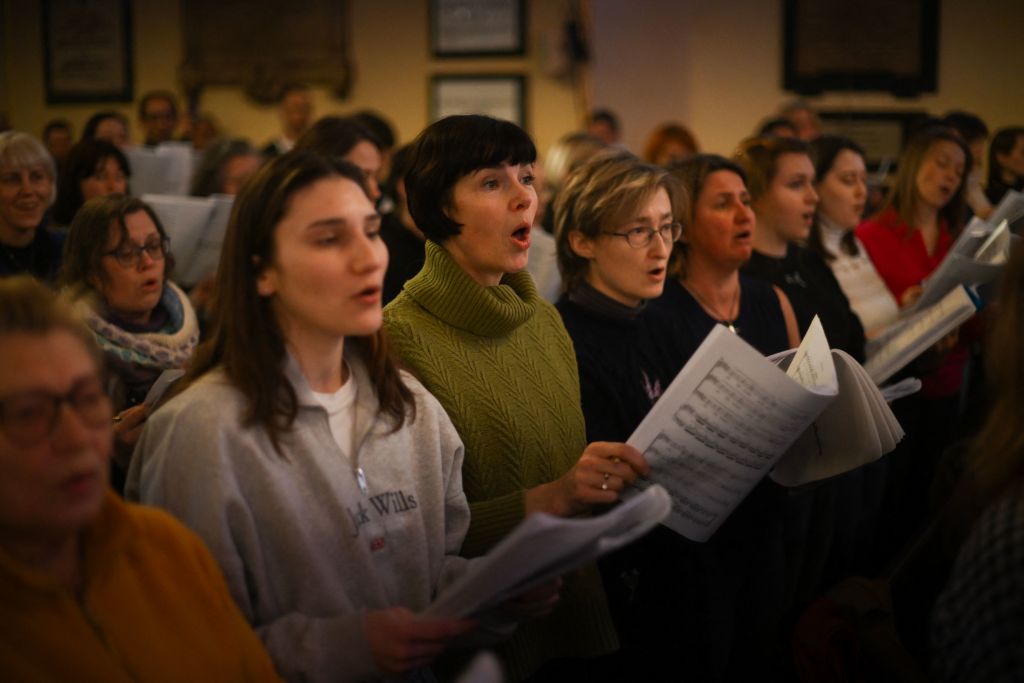Last fall, I officially joined the church choir. I’d sung with it through Advent and Christmas, but after the end of the season, I decided to continue. Wednesday nights now find me in the church basement practicing anthems, marking my score, or more recently, beating out the rhythm of the opening chorus of Bach’s St. John Passion, bobbing and weaving like a human metronome. I can’t remember when I’ve been happier.
It’s no secret that American institutional life is on the decline especially after COVID. At the same time, both loneliness and political tribalism are on the rise. We’re simultaneously suspicious of formal affiliation, deeply isolated from one another, and increasingly likely to cluster around ideology. To me, this suggests we don’t simply need more activity or more people in our lives. Instead, our current challenge lies in the nature of our relationships and how we form them.
In A Primer in Christian Ethics, ethicist and Duke Divinity School professor Luke Bretherton names intimate relationship as the basic building block of human society. He’s not speaking of romance but the ability to connect with others in mutual dependence to accomplish shared goals, much like choir members unite and harmonize their voices. These relationships are intimate insofar as they require both vulnerability and trust. But this also makes them inherently risky because they open us to exploitation by others. To protect ourselves, Bretherton argues, we develop shared norms, then institutionalize these norms in formal ways. These official relationships (what Bretherton names “covenants”) run the gamut from marriage to legal contracts to membership pledges. But they all formalize the terms of particular relationships in order to support and protect them.
Covenanted relationships require naming and binding ourselves to certain expectations—which inevitably limits our freedom and creates tension for us in the modern West. Our culture assumes the inviolability of personal autonomy and individual choice; intentionally restricting ourselves regardless of what better options might come along runs counter to this. One small way I’ve noticed we struggle to bind ourselves is how often we remain noncommittal about attending social events. Besides “yes” and “no,” online RSVPs now include the choice “maybe”—which undermines the whole purpose of a response.
But even as we resist formalizing our commitments, the need to belong doesn’t go away. To say that human beings are social creatures is not aspiration as much as description. Despite our disinclination to obligating ourselves, bonding continues because bonding is what we do. When we reject formal ways of relating to each other, we also lose the stabilizing benefit of covenant that in turn opens the way for other, more eclectic and erratic forms of connection.
Another seemingly innocuous example of our disorganized attachments is how often we define non-familial relationships as family. In the workplace, co-workers describe each other as their “work spouse,” borrowing the categories of husband and wife to denote particularly close partnerships. The gym where I work out insists on ending every 30-minute session with a rousing cheer of “1-2-3-Family!” (If this is true, I’d like the friends and family discount, please.) Many churches also use the language of family instead of membership or congregation. There’s historic precedent for this—those ordained to holy orders or who take vows have long been named “Father” and “Mother”, “Brother and “Sister” and the New Testament speaks of the early church as a household. But in contemporary churches, we’re generally not making lifelong commitments to each other or sharing goods and property. And we can’t really claim to be “family” when nearly 30 percent of church switching happens because “something changed about the church that I did not like.”
I suppose we’ve landed on the language of family because, when healthy, it represents the safety and stability that eludes us when we don’t know where we belong in the world. Or to whom we belong.The flip side to our modern cult of self-creation is that we must also actively choose every relationship we have. Lacking the begottenness that family represents—that kind of belonging that doesn’t rest on our ability to create or sustain a relationship—we grasp for it every chance we get. But if everyone is family, no one is. And misnaming our relationships in an attempt to bond with others without making real-world commitment to them leads only to confusion and disappointment when those same relationships fail to deliver what only covenanted ones can: What happens when you get laid off from your work “family”?
Even more ironically, family is built on the formalization of relationships. This isn’t simply a claim about marriage being the building block of society. Relationships are the basic building blocks, and formal covenants protect those relationships. Marriage names the relationship between two people in particular terms, then holds them in a structure of expectation and accountability on which flourishing partnership depends. That marriage is “a piece of paper” is precisely the point.
But so are birth certificates and adoption records that formally name mothers and fathers—as are last wills and testaments, labor contracts, and yes, even constitutions. These are the covenants that define the specific nature of our relationships in order to preserve the very relationships that allow us to thrive. And in all of them, we formally recognize who we are to each other. We are husbands and wives and sons and daughters. We are co-workers. We are employers and employees. We are fellow citizens.
Even more ironically, our resistance to “defining the relationship” may fuel the rise of political tribalism insofar as it creates a relationship vacuum to be filled by ideology and persona. After all, part of the appeal of authoritarian rhetoric—especially to those who lack soft skills or are social outsiders—is its clarity. When relationships are not well-defined, they become something of a moving target.This privileges those who can naturally read the nuance of interpersonal interaction and adjust. Meanwhile those who need more objective boundaries will find safety in voices that tell them who belongs and who doesn’t and in which direction to march.
But healthy formalized relationships—even one as simple as belonging to a choir—can provide similar freedom and clarity. One of my favorite things about choir is that my inclusion doesn’t depend on my ability to sustain the relationship through personality or some unspoken code. We are all friendly, but we are not all friends. We chat between songs, but small talk is not necessary. All one must do to be included is show up, know your music, and generally stay on pitch. In this way, the structure of the institution both holds a place for me and holds me in place. All I have to worry about is singing.
This last week marked the fourth anniversary of the initial COVID shutdown in the United States. Given the virus’s airborne nature, choirs took on a particularly ghoulish cast in that season, and quickly became associated with mass outbreak and death. But this coming week, March 21 also marks the birthday of J.S. Bach. One of the distinct features of Bach’s work is its regularity and formalization. Parts run in different directions, seemingly independent of each other, but steady rhythms and ingenious form make them work together as a whole. The underlying structure is not simply a stylistic choice. It is what allows each voice to retain its independence while also aligning with other voices at just the right moment to produce harmony. To sing Bach well, you must lean into structure.
I wonder if the same isn’t true for our relationships whose current fluidity will eventually become the very thing that forces us to clarify who we are to each other. I tend to agree with the late Dorothy Sayers, who understood societal trends as cycles of self-correction. In her 1942 essay “Why Work?” she observes that “people who would not revise their ideas voluntarily find themselves compelled to do so by the sheer pressure of the events which these very ideas have served to bring about.”
At some point, our preference for personal autonomy over covenanted relationships will become untenable. We may feel like we are freeing ourselves from constraint, but we’re actually being cut loose. To survive, we’ll need to find new ways of tethering ourselves to each other. But in the meantime, let me suggest that you officially join a choir. Or a church or a bird club—something that names a particular relationship and requires a commitment. Even more importantly, don’t ask that relationship to be anything other than it is. Your fellow members might become your friends, or they might just remain fellow members, but this will be more than enough. Then, find your section. Show up. Learn your part. And sing.








Please note that we at The Dispatch hold ourselves, our work, and our commenters to a higher standard than other places on the internet. We welcome comments that foster genuine debate or discussion—including comments critical of us or our work—but responses that include ad hominem attacks on fellow Dispatch members or are intended to stoke fear and anger may be moderated.